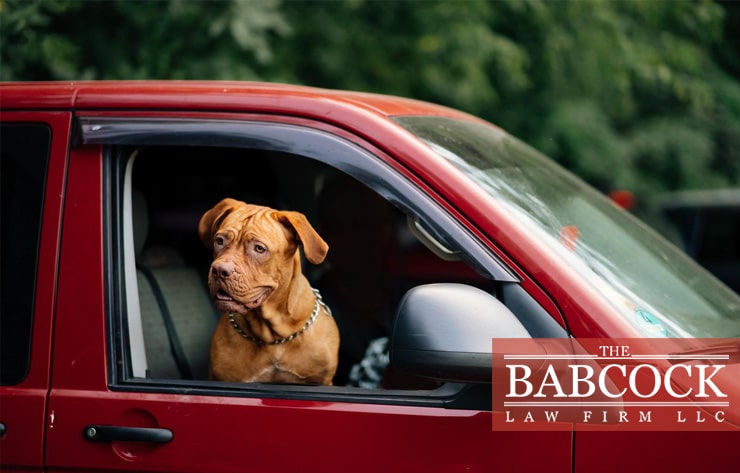
Learn about the vital role strict liability plays in some Colorado accident cases
In many personal injury cases, the defendant isn’t necessarily accused of acting with malicious intent or the intent to injure anyone. A clear example of this is strict liability, which can lead to a person being found liable for damages despite an absence of malice or negligence.
In this article, we’ll explain the basics of what Coloradoans need to know about strict liability.
If you have further questions, reach out to an experienced Colorado personal injury lawyer at The Babcock Law Firm.
What is strict liability?
Strict liability is the idea that a person can be found responsible for legal damages even if they didn’t intentionally cause the injury or harm in question. While that might sound similar to the concept of negligence, it’s actually much stricter.
Negligence is the idea that while a person didn’t set out to maliciously hurt someone or harm something, they behaved negligently and with a disregard for how their actions might affect the people or property around them.
For example, many slip-and-fall lawsuits are issues of negligence. If a customer is harmed by slipping and injuring themselves on a wet floor in a restaurant, it’s unlikely that the business intended to hurt any of its customers. However, it was negligent for them to fail to clean up the water or label the floor as wet.
Strict liability, on the other hand, permits a defendant to be found responsible for damages even though neither malice nor negligence is at play. The most common example of this, especially when it comes to Colorado’s strict liability laws, is animal attacks and dog bites.
Proving Colorado Negligence Claim
In Colorado negligence lawsuits, a defendant is only obligated to compensate the plaintiff for the proportion of the injury the court determines them to be at fault. For example, if the plaintiff is found to be 25 percent responsible for the accident, then they can only sue for 75 percent of the total costs.
Understanding Colorado’s dog bite law
Let’s say John is walking his dog, Nora.
Nora has never had a history of aggression or violence and has always been nothing but friendly with other dogs and people. As John and Nora are walking, Sarah runs by on her morning jog. Out of nowhere, Nora growls and lunges at Sarah, biting her on her thigh.
John obviously didn’t go on his walk with the intention of hurting Sarah. Perhaps you could call him negligent if he was walking an unmuzzled dog with a history of bites and aggression, but in this case, he was certain that the dog was nothing but friendly and sweet. John wasn’t malicious and he wasn’t negligent. However, due to Colorado’s strict liability law, he could still be legally responsible for Sarah’s injuries.
Colorado’s dog bite laws are the same whether the owner is aware of the dog’s level of aggression or not. While this entitles the victim of the bite to pursue compensation for medical bills and lost wages, it doesn’t necessarily entitle them to certain damages, like compensation for emotional distress or pain and suffering.
Not all dog bites automatically fall into the category of strict liability, however. For example, groomers and veterinarians aren’t covered by this law, as it’s understood that this is a risk one assumes when they enter such a line of work. Furthermore, a bite victim can’t sue under strict liability if they were trespassing when the bite happened. This is especially true if “beware of dog” signs were present.
Also, someone cannot claim strict liability if the victim was doing something to antagonize or abuse the dog before the biting incident occurred. This defense is commonly used by dog owners to try to make a case that the victim did something to provoke the animal. However, unless there’s evidence that the victim did something to intentionally provoke an aggressive reaction from the dog, it’s not a solid argument.
Strict liability for defective or dangerous products
Another example of strict liability in Colorado law pertains to product liability. A manufacturer may be found responsible for damages if a consumer is injured due to negligence, manufacturing flaws, a defect of design or a failure to appropriately label a product as potentially hazardous.
To prove strict liability in such cases, certain criteria must be met. The plaintiff must be able to prove that the injuries they suffered were the direct result of the manufacturer’s failure to produce a safe product or to provide the appropriate warnings about the product’s inherent risks.
If the plaintiff is alleging that the specific product they received was damaged, it must be proven that this occurred during the manufacturing stage and not after the product had left the manufacturer’s possession.
The counterarguments made by manufacturers often include the following:
- The product was manufactured correctly and free of defects, but the customer used it incorrectly.
- The product was damaged after it was in the control of a third-party retailer or reseller, not the manufacturer.
- The product was labeled appropriately, but the customer failed to adhere to the posted warnings.
Although the manufacturer may try to argue that they aren’t responsible, a good attorney will work to prove that their actions lead to the personal injury of the plaintiff.
How to prove strict liability
If you’ve been the victim of a dog bite or defective product in the state of Colorado, then it should be a relief to know that the law is on your side. The first step in recovering economically and seeking justice is by hiring a skilled legal representative who will stand up for you in court and ensure that the state laws are properly applied to your case.
At The Babcock Law Firm, we are committed to seeking justice, fairness and appropriate restitution for our clients. Being the victim of a personal injury case is traumatizing enough. You don’t have to go through the legal fight alone.
Contact us today to schedule your free consultation and learn more about how representation works.


